Whether you like spending your day making sandcastles, exploring nature in the hills and dales or being spoilt rotten in a big hotel, the UK has plenty of options for summer breaks.
But how did these vital ingredients of a British holiday came into being? When did we start sleeping in tents for fun? What was the first holiday caravan like? Where was the first hotel? ┤¾¤¾┤½├¢ Bitesize has unpacked the info on the places and objects that have brightened up our leisure time since the end of the 19th Century.
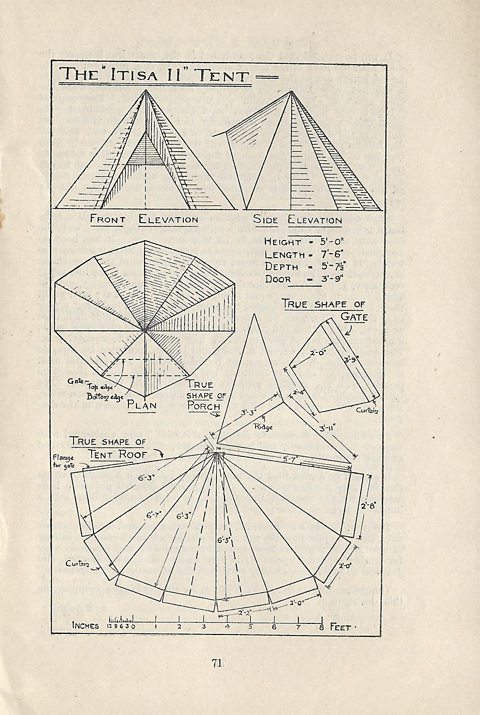
The first tents and campsites
Sleeping under canvas, preparing breakfast over a portable stove, then packing it all away in your rucksack to go home again. ItÔÇÖs something of a British holiday tradition.
When people first started camping holidays in the late 19th Century, as Simon McGrath, editor of the Camping and Caravanning Club magazine told Bitesize, there werenÔÇÖt really tents designed for purpose available to holidaymakers. Instead, tents used by the military or explorers - or marquees made for hospitals - were used instead.
In 1901, the Association of Cycle Campers was formed, which became The Camping and Caravanning Club. Members wanted the best equipment for their leisure trips, so the club set up a ÔÇÿsupplies departmentÔÇÖ in 1906 to help provide them.
In the early days, the club magazine showed campers how to make their own holiday tents, often providing helpful diagrams and instructions. In 1916, one of the earliest became commercially available. It was designed by James Wood and called the Itisa Tent (because ÔÇÖit is a tentÔÇÖ) and was lightweight, supported by a single pole. As cars became more popular, in 1923, the company BlackÔÇÖs of Greenock advertised a lightweight tent for motor camping that was designed to be carried on a carÔÇÖs running board.

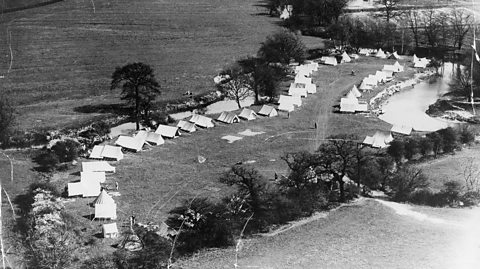 Image source, The Camping and Caravanning Club
Image source, The Camping and Caravanning ClubAs camping developed, holidaymakers needed somewhere to travel to and pitch their tents. In 1913, a site in Walton-on-Thames opened. Still in operation today, itÔÇÖs confidently described by the Camping and Caravanning Club as the oldest permanent campsite in the world. It is based on the River Mole, a tributary of the River Thames and when it first opened, campers were charged 6d (around two-and-a-half pence in today's money) to pitch their tents for the night.
Hotels of all descriptions
ItÔÇÖs tricky to say for sure what the first hotel in the UK was, as there doesnÔÇÖt appear to be a definitive record. The Old Bell Hotel in Malmesbury, Wiltshire, dates back to 1220, and is said to be the oldest purpose-built hotel in England still in operation today. Back in the 13th Century, its guests were monks, paying a visit to the nearby abbey.
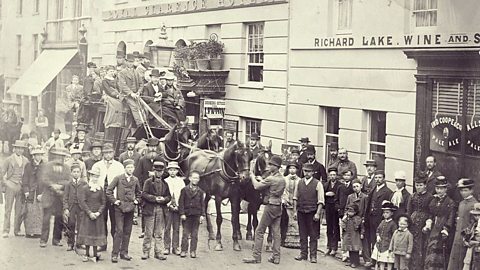
Hotels can be a luxury for many people, and the more affordable bed and breakfast has been a popular alternative for anyone keeping an eye on the pricetag. In the past decades, budget hotels have also become popular. The Travelodge company has claimed that theirs was the first in the UK, opening in 1985 on the A38 at Barton-under-Needwood in East Staffordshire, with a room for a family costing £24.50 a night.
A holiday home attached to your car
Caravans have been part of British culture for centuries, especially those pulled by horses. In 1919, however, a caravan arrived on the market that was intended to be towed by a car.
It was called an Eccles, versions of which can still be seen on the road today. The name came from its original makers Eccles Motor Transport, and the father-and-son team of Bill Riley Senior and Bill Riley Junior. The price tag on the first Eccles was ┬ú90, around ┬ú5,000 in todayÔÇÖs money, and cars towed them with a leather strap.
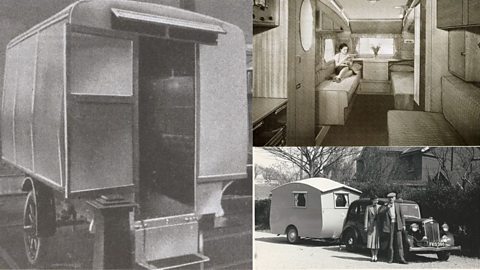 Image source, ANDREW JENKINSON/THE CAMPING AND CARAVANNING CLUB
Image source, ANDREW JENKINSON/THE CAMPING AND CARAVANNING CLUBInside, the caravan had somewhere to sit and sleep, but unlike the more modern equivalents, there was nowhere to wash and there was no toilet, nor was there anywhere to cook. As caravan ownership took off, all these facilities eventually found their way into the layout, but that first caravan remains a basic template for those towed around the roads to this day.
Holiday camps - without chalets
A traditional idea of a holiday camp is rows of chalets, big swimming pool, entertainment venues, somewhere to sit down for your breakfast, lunch and tea, and perhaps even a funfair. ThatÔÇÖs before we even mention the 'who's got the knobbliest knees?' competitions which were popular in the 1950s and '60s.
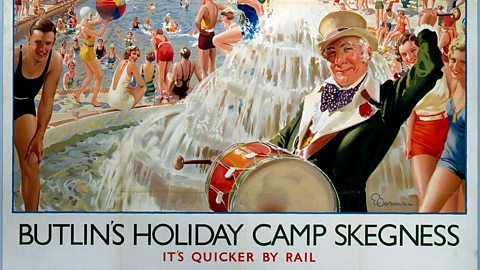
All that came with the opening of the first Butlin camp in Skegness in 1936 by the entrepreneur Billy Butlin. It wasnÔÇÖt the first holiday camp the UK had known, however. That honour went to The Cunningham Young MenÔÇÖs Holiday Camp, opened in 1894 by Joseph and Elizabeth Cunningham. Originally from Liverpool, they were involved in youth work and wanted somewhere they could take groups of boys on holiday.
In 1898, CunninghamÔÇÖs went commercial and any men could book to stay there. It proved so popular, the camp expanded onto another five acres of land in 1904, allowing for another 1,500 tents and 100ft dining pavilion. There was even an outdoor escalator, which took campers down to the seafront.
Jill Drower is Joseph Cunningham's great-granddaughter and has written a book on the history of the camp. She told Bitesize: "Alongside the tent accommodation, the Cunninghams supplied all the things you might enjoy at a top hotel; a palm court, a fernery, an orchestra to play at every meal, smartly-dressed waiters, tennis courts and a swimming pool. By offering the kind of facilities that only the very best hotels could provide, [the camp] made several jumps up the social scale in its appeal."
Holiday camps by other names may feature more in the history books, and this could be due - in part - to an act introduced in 1938 which allowed working people in the UK to take a paid holiday. It saw holiday camps thrive in popularity after the Second World War, but by that point the CunninghamÔÇÖs camp had been bought by another company.
This article was published in July 2022.
Which animal has the longest migratory journey on Earth? Here are five animals that prefer to 'chill' in colder climates.

Who invented the weekend?
How faith and a little altruism led us to having Saturday and Sunday off.

What happens to our bodies in a plane?
Why food tastes different and you may break wind more often.
